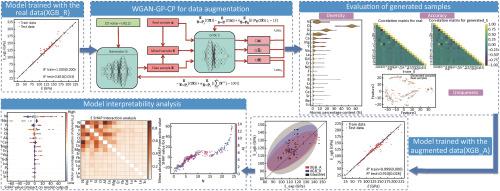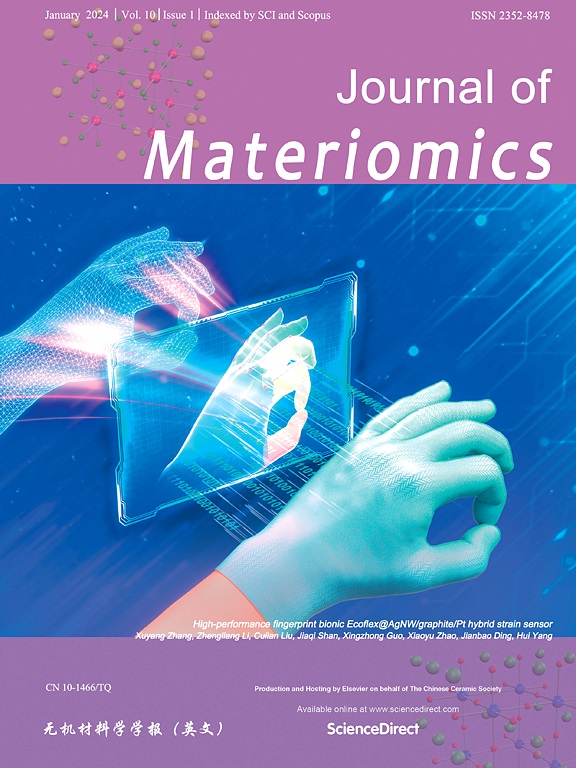基于梯度惩罚和内容约束的Wasserstein生成对抗网络的氮化氧玻璃数据增强机器学习模型
IF 9.6
1区 材料科学
Q1 CHEMISTRY, PHYSICAL
引用次数: 0
摘要
数据驱动的机器学习方法已被证明在预测玻璃性能方面非常成功,但在处理小数据集时受到阻碍,例如具有优异机械性能和化学稳定性的氮化氧玻璃。本文建立了一种基于Wasserstein梯度惩罚(GP)和内容约束惩罚(CP)项的生成式深度学习模型(通过生成器和判别器的对抗训练)的数据增强方法,其中GP和CP项保证了训练稳定性和生成样本的物理合理性。结果表明,生成的样品在预测精度和泛化能力方面提高了用XGBoost算法训练的氮化氧玻璃成分-性能模型的性能。此外,增强模型在101个未包含在训练数据集中的实验样本上优于一般的玻璃预测模型GlassNet。基于SHAP的单特征分析和特征相互作用分析,可解释性研究进一步揭示了元素的贡献以及元素对相互作用对氮化氧玻璃性能的影响。这些成果不仅为氮化氧玻璃的组成性能研究提供了可靠的模型,而且为在数据稀缺的情况下开发高性能数据驱动模型提供了一种新的策略。本文章由计算机程序翻译,如有差异,请以英文原文为准。

Data-augmented machine learning models for oxynitride glasses via Wasserstein generative adversarial network with gradient penalty and content constraint
Data-driven machine learning methods have been proven highly successful in predicting glass properties, but hampered when dealing with small datasets, such as oxynitride glasses with excellent mechanical properties and chemical stability. Here, a data augmentation method based on the Wasserstein Generative Adversarial Network with Gradient Penalty (GP) and Content Constraint Penalty (CP) terms, a generative deep-learning model via the adversarial training of a generator and a discriminator, was established, in which the GP and CP terms ensure training stability and the physical rationality of the generated samples. The results indicate that the generated samples improve the performance of the oxynitride glass composition-property models trained with the XGBoost algorithm in terms of prediction accuracy and generalization capability. Furthermore, the augmented models outperform the general glass prediction model, GlassNet, over 101 experimental samples not included in the training datasets. Based on SHAP's single feature analysis and feature interaction analysis, the interpretability study further sheds light on the contributions of elements and the interactive effects of element pairs on the properties of oxynitride glasses. These achievements not only provide reliable models for the composition-property studies of oxynitride glasses but also offer a novel strategy for developing high-performance data-driven models under data scarcity scenarios.
求助全文
通过发布文献求助,成功后即可免费获取论文全文。
去求助
来源期刊

Journal of Materiomics
Materials Science-Metals and Alloys
CiteScore
14.30
自引率
6.40%
发文量
331
审稿时长
37 days
期刊介绍:
The Journal of Materiomics is a peer-reviewed open-access journal that aims to serve as a forum for the continuous dissemination of research within the field of materials science. It particularly emphasizes systematic studies on the relationships between composition, processing, structure, property, and performance of advanced materials. The journal is supported by the Chinese Ceramic Society and is indexed in SCIE and Scopus. It is commonly referred to as J Materiomics.
 求助内容:
求助内容: 应助结果提醒方式:
应助结果提醒方式:


